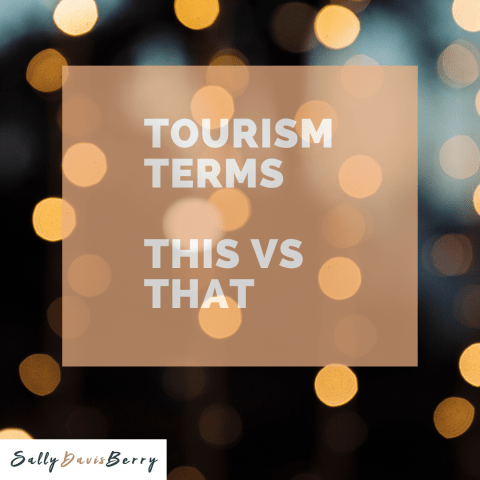 One of the reasons I started a tourism industry blog in 2016 was to give people a way to have their questions answered, and learn more about this huge part of our economy.
One of the reasons I started a tourism industry blog in 2016 was to give people a way to have their questions answered, and learn more about this huge part of our economy.
Learning on the job and through trial and error are not the most efficient strategies for anyone. One of the most downloaded resources I created is the 25 Terms Every Tourism Pro Should Know. I also have a Free Resources section on the Tourism Pro Academy site that contains more ebooks and guides – check it out here.
I partner with DMO’s (Destination Marketing/Management Organizations) to offer online training to their members. There is a live Q& A session at the end of every webinar and I am always excited to hear the questions and see the enthusiasm of the attendees. I started a list of questions that I often hear and thought I would share these today. Perhaps you have had the same questions yourself!
What is the difference between…
Group tour operators vs Group tour leaders
A Group tour operator is someone who works in the industry as their job. They create tour packages, promote and sell them. Tour operators have websites, business cards, offices ( although they often have home offices these days) and a business plan. You meet with Group tour operators at tradeshows such as ABA and NTA.
Group tour leaders are people who plan tours as a hobby, retirement job or as a way to earn free travel. They work directly to convince their friends, clubs, alumni groups or neighbors to travel as a group. They don’t have websites, rarely have business cards and often require a lot more hand-holding during the reservation process.
Why is the distinction important? Because you need to give Tour Operators a bigger discount. I always tell my clients that the discount to a tour operator should be between 25-35% minimum. Group leaders should get a smaller discount: 10-15%. I discuss this in more detail in my online course (Fill Your Parking Lot – Secrets to Getting More Group Tours) but knowing the difference will make your Tour operator clients happy!
Retail vs. Custom tours
If a tour company specializes in retail tours, that means they put together tour packages and then promote them to their customers and the general public. They do not know the number of customers on the bus until they are closer to the departure date. They rely on advertising, print and online brochures and word of mouth from past clients to bring in business.
Operators that specialize in Custom tours get their business from existing ( or pre-formed) groups that contact them for help with planning a trip. Example – Sue’s softball team wants to go to a major league ballpark, some cool dinner spots, and somewhere where they can make a souvenir to take home. The staff at the tour office will put together some sample itinerary ideas based on the team’s budget and destination ideas. When you get a booking from that type of tour operator, the number of customers is pretty close to the actual number that will arrive.
Wholesale vs. Direct to Consumer Tours
A tour operator who tells you they are a wholesaler is telling you that they sell their tours to other tour companies. So they are a B-B, or business-to-business type company. Their customers are not people who get on the bus; their customers are other tour companies. I love it when I find a wholesaler because I know there is a big potential to send you multiple buses over the next few years. Treat your wholesaler clients like Gold!
When a company sells directly to consumers, they are called Retail or Custom tours as described above. That means you are reliant on them to do a good job selling a tour you are in. Help set them up for success by having updated images of your business or destination available for download. Give them a short but great description they can use and be open to any marketing opportunities they present.
Remember, you are working with them as a team to promote your tourism business and to get more visitors through your doors.
Receptive Operator vs. a Receptive Operator
Wait, what? Isn’t that the same term? Yep. There are two different types of receptive operators and this is confusing for sure.
a. This type of Receptive operator specializes in international visitors. They are U.S. based companies concentrated in NYC, Miami/Orlando, and LA. Their job is to act as the middleman between tour companies and travel agencies in foreign countries, and your business here in the U.S. You couldn’t possibly reach out to all the travel agencies in the U.K, Germany, China, France, etc so if you want to capture visitors from those markets, you will need to search out Receptive operators. This type of Receptive operator typically specializes in just a few countries, and will often do either FIT ( Foreign Independent travelers) or group business.
b. Another type of Receptive operator is someone who is an expert in their local destination and can help put together itineraries and act as a step on guide (they literally will ‘step on to’ the bus for the day and act as the local tour guide). Destinations that have a local receptive operator can work with them to make sure they know the area very well and can promote them.
When I worked at a regional DMO, I was often asked for some suggestions for receptives, or step on services. Once when there were none available, I offered to provide step-on services for the day. I studied up on the itinerary for the day, learned some facts and stories about our stops, and acted as their Receptive Operator for the day. It was really fun, quite educational and exhausting! Receptives are often aware of hidden gems that the tour operators don’t know about so they can be a real asset to a tour.
Can I ask a favor?
I would love it if you would share this post with at least 2 people who would benefit from the information. And then they can sign up below to receive posts delivered straight to their inbox. Thank you! 😁

